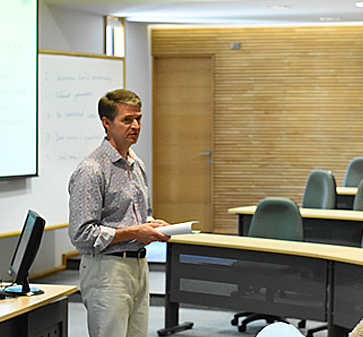Brooks Holtom: «Openness to new ideas and experiences are critical for good negotiators».
enero 12, 2018

[:es]Professor Holtom came to the MBA UC to the International Summer Program to teach «Negotiation» course to our national and international students of the program. He specializes in organizational behavior and human resource management. His current research focuses on how organizations acquire, develop and retain human and social capital. He teaches courses in organizational behavior, human resource management and negotiation. He works with executives on issues involving decision making, negotiation, leadership, motivation and strategic human resource management.
We asked him about his course and his visit to Chile, and this is what he answered us.
What is the motivation to come do classes in Chile and what do you expect from your trip here?
Because I had previously taught PUC – EMBA students at Georgetown, I knew there would be excellent students in my class. I was energized to come and share my research and teaching experience with them. I also loved the idea of having students from other universities across the world in the class as this enriches the learning for all–especially with a topic like International Negotiations.

Why do you think our students would benefit from your course?
We are all negotiating every day. Sometimes we negotiate with ourselves (e.g., should I get up early to exercise or rest?). Often we are negotiating with co-workers or our boss (e.g., deadlines or budgets for a big project). Sometimes we are negotiating major contracts that will make or break our companies. And sometimes we are negotiating with loved ones (e.g., planning a vacation with your significant other). In short, everyone needs to learn how to be a better negotiator.
How do cultural aspects affect negotiation?
When negotiators are from the same culture, their values are generally similar and so they do not exert much influence on the negotiation. However, when the cultural values of one person conflict directly with the values of another, negotiations become complicated very quickly. For example, when a person from a culture that values progress and development is negotiating to acquire land to build a shopping center with someone who values a traditional way of life, they will not share the same assumptions about what is good, or fair, or right. Thus, a good negotiator will seek to understand the culture and the values at its foundation.
Why is it important to understand how cultural aspects affect negotiation?
You can learn by making mistakes or you can learn from the mistakes of others. The former route is very expensive. Over history, many mistakes have been made that help us to better understand and anticipate cultural challenges that may exist. With solid research as a foundation and helpful frameworks as a guide, negotiators who are sensitive to these factors will create and claim more value for their stakeholders over time.
What are the characteristics that a good negotiator must have?
Openness to new ideas and experiences are critical for good negotiators. A willingness to ask questions and listen carefully are vital. Being respectful and kind cost you nothing, yet they can open doors and create trust that enable successful agreements and deals. Intelligence is helpful as well. Expert negotiators love working with others who are highly skilled. It allows them to move more quickly and to create more value for all.
More Information:
Nicole Vidal/Digital Communication MBA UC
nsvidal@uc.cl[:]
Sigue explorando


Profesor Rodrigo Cerda comenta en el artículo "Reactions to Brexit from across the Global Network"

Luis Hernán Bustos: "La industria alimentaria debe demostrar un esfuerzo continuo por proveer mejores alimentos y construir su posición desde los ejes de credibilidad y responsabilidad"



